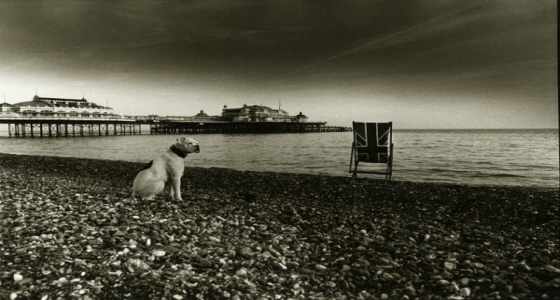Dennis Munday on Setting Sons and The Jam
Written by Dennis Munday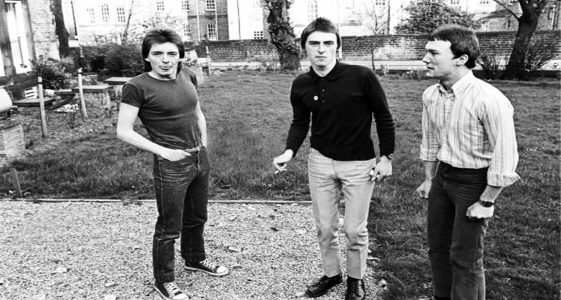
After the stunning triumph of All Mod Cons in 1978, how would 1979 turn out for The Jam? The next phase of their career was crucial and they needed to consolidate the success of their third album. As far as singles went, the band and Paul had problems coming up with a song that equalled the (chart) success of All Mod Cons.
At the time, Polydor saw this as a weakness, failing to realise that The Jam were developing into an album band that made singles. Prior to 1979, even The Clash was struggling in the singles chart, and their highest chart position came with ‘Tommy Gun’, which just sneaked into the top twenty. However, no matter how successful an artist is, a major record company can make or break them, and quite easily ruin their career. If they go off the boil or decide they are a spent force, they will move quickly on and in 1979, this nearly happened to the Jam.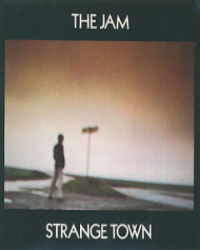 When The Jam released their seventh single ‘Strange Town’, it was a bit of a mix and match affair. The bridge was poached from ‘Worlds Apart’, a song demoed in February 1978, and Paul subtly borrowed a part from a Buzzcocks song. There is no doubt that after the blinding success of All Mod Cons, the band was under pressure to deliver, and perhaps this weighed heavily. Even the production values of ‘Strange Town’ are down on the third album, and I’m not suggesting that Vic Smith did a bad job. They had two stabs at recording the song, which indicated to me that there were problems from the start. There’s hardly any space and it has a claustrophobic feel, although, once the song was played in live, it came across more directly. Released on 9th March, it went to number 15 in the charts.
When The Jam released their seventh single ‘Strange Town’, it was a bit of a mix and match affair. The bridge was poached from ‘Worlds Apart’, a song demoed in February 1978, and Paul subtly borrowed a part from a Buzzcocks song. There is no doubt that after the blinding success of All Mod Cons, the band was under pressure to deliver, and perhaps this weighed heavily. Even the production values of ‘Strange Town’ are down on the third album, and I’m not suggesting that Vic Smith did a bad job. They had two stabs at recording the song, which indicated to me that there were problems from the start. There’s hardly any space and it has a claustrophobic feel, although, once the song was played in live, it came across more directly. Released on 9th March, it went to number 15 in the charts.
The B-side, ‘The Butterfly Collector’, is a guv’nor track and without a doubt, a Jam classic, and a song that wouldn’t have been out of place on All Mod Cons. Influenced by The Kinks ‘Shangri La’, it is a riveting piece of music, with lyrics exaggerating the lifestyle of Soo Catwoman. A girl who hung out with the bands during the punk era. It is a better song than the A-side, both lyrically and musically, but there was never a chance of it coming out as a single. The content was too explicit and after previous problems, there was no way Radio 1 would have given it airtime. The picture bag for this single has a blurred image of a man standing at a crossroads, which just happened to be Bill Smith, who designed the sleeve.
Although The Jam had enjoyed success in the album charts, their singles never sold beyond their hard-core fan base. If they were going to cross over into the mainstream, they needed to improve the chart performance of their singles. When ‘Strange Town’ only went to 15 and, after the heady success of their third album, Polydor falsely saw this as a failure. Some execs actually believed, All Mod Cons was The Jam’s apex, and like the punk movement, The Jam was about to implode.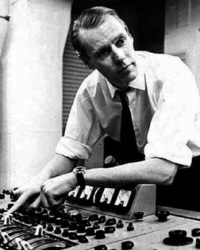 Following this, the company went behind my back and decided it was the time to try another tried and tested industry ploy to obtain chart success. Namely, bring in a heavyweight (famous) producer. If I’d have thought Vic wasn’t good enough, I would have said something when Chris Parry moved on, but the production values of All Mod Cons proved he was more than up to the job. The producer they came up with was the legendary Sir George Martin, whom they saw as the man to smooth out The Jam’s sound, and make them more acceptable for the American market. Although Sir George is one of the all-time great producers, in my opinion, he was the wrong man for The Jam and I am not writing this comment in hindsight. He was from my father’s generation and served as an officer in the Fleet Air Arm during the Second World War. At the time, The Jam went into the studios to record Setting Sons he was in his fifties, and had no affinity and very little time for punk music. I could have understood if Polydor had gone for a more contemporary producer, but by going for Sir George, they were just looking for a shortcut to success. The band quite rightly stuck by Vic, but this didn’t help in the long term, and for the rest of the time he worked with The Jam he was ambivalent towards Polydor. Vic may not have been up there with the fifth Beatle, but as far as I was concerned, you don’t change a winning jockey. Production values weren't the problem With ‘Strange Town’, even Mr Sheen would have had a problem putting a gloss on this track.
Following this, the company went behind my back and decided it was the time to try another tried and tested industry ploy to obtain chart success. Namely, bring in a heavyweight (famous) producer. If I’d have thought Vic wasn’t good enough, I would have said something when Chris Parry moved on, but the production values of All Mod Cons proved he was more than up to the job. The producer they came up with was the legendary Sir George Martin, whom they saw as the man to smooth out The Jam’s sound, and make them more acceptable for the American market. Although Sir George is one of the all-time great producers, in my opinion, he was the wrong man for The Jam and I am not writing this comment in hindsight. He was from my father’s generation and served as an officer in the Fleet Air Arm during the Second World War. At the time, The Jam went into the studios to record Setting Sons he was in his fifties, and had no affinity and very little time for punk music. I could have understood if Polydor had gone for a more contemporary producer, but by going for Sir George, they were just looking for a shortcut to success. The band quite rightly stuck by Vic, but this didn’t help in the long term, and for the rest of the time he worked with The Jam he was ambivalent towards Polydor. Vic may not have been up there with the fifth Beatle, but as far as I was concerned, you don’t change a winning jockey. Production values weren't the problem With ‘Strange Town’, even Mr Sheen would have had a problem putting a gloss on this track.
As we approached their eighth single, there was no chance of a ceasefire in hostilities. I was hopeful that, ‘When You’re Young’ would change this, and give everybody what they wanted. When I heard the track, as far I was concerned, it was going to be the single that would crack the top ten. The song was precursor to the way the band was developing, as well as an indication of the direction of their next album. It was stronger lyrically with a much more direct storyline. There was even a hint of reggae in the break, perhaps suggesting that Paul was listening to something different. The B-side, ‘Smithers-Jones’, is Bruce’s finest contribution to the Jam songbook. The sentiments of this song are as prevalent now, as when it was written in 1979, with principles and loyalty counting for nowt. 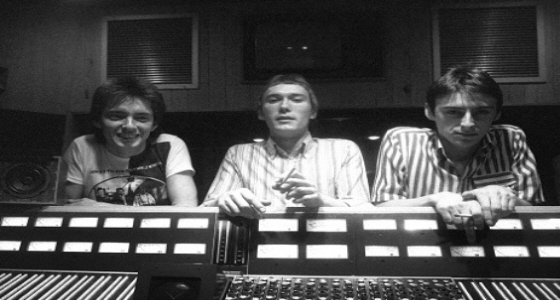
‘When You’re Young’ was released on 17th August, but stalled at 17 in the charts and like ‘Strange Town’, sold around 150,000 copies. I was disappointed with this showing and, as far as I was concerned, the record and the band was good enough, but not Polydor. I was running around the office like a bear with a sore head and looking for a scapegoat. At the same time, Sham 69 had a massive hit record with ‘Hersham Boys’, which sold in excess of 250,000, and reached number six in the charts. Even though, they were one of my bands, it didn’t help my mood, which turned blacker by the day. Many of The Jam’s contemporaries were having bigger hits, but very few were writing lyrics in the same vein as Paul. ‘Blondie’s ‘Heart of Glass’ and ‘Sunday Girl’, The Police’s ‘Message In A Bottle’ and ‘Walking on The Moon’, Gary Numan’s ‘Are Friends Electric and ‘Cars’, were pure pop records. I have always believed that Paul could have written songs of this ilk throughout his career, but chose not to. He wanted The Jam to mean something, his lyrics were important, and Paul wanted to be a quality songwriter. 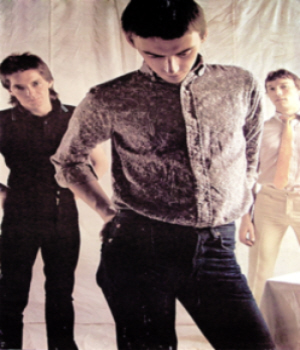 I wrongly blamed our promotion department for the lack of success of ‘When You’re Young’. When a promo man fails to get your records played on the radio, they come back with a plethora of excuses. The hook wasn’t good enough or the lyrics were too hard, and they’re not playing this kind of single at the moment, as well as your band’s wearing the wrong kind of underpants. Tony Bramwell was The Jam’s promotion manager and a legend in the record industry. Tony grew up in Liverpool, was best friends with George Harrison, and worked for The Beatles. There were no doubting his credentials and he knew everyone who was anyone in the music business. However, the boys and John were unhappy about the way he worked on their records and, as far as they were concerned, it was sod his track record he wasn’t doing it for The Jam.
I wrongly blamed our promotion department for the lack of success of ‘When You’re Young’. When a promo man fails to get your records played on the radio, they come back with a plethora of excuses. The hook wasn’t good enough or the lyrics were too hard, and they’re not playing this kind of single at the moment, as well as your band’s wearing the wrong kind of underpants. Tony Bramwell was The Jam’s promotion manager and a legend in the record industry. Tony grew up in Liverpool, was best friends with George Harrison, and worked for The Beatles. There were no doubting his credentials and he knew everyone who was anyone in the music business. However, the boys and John were unhappy about the way he worked on their records and, as far as they were concerned, it was sod his track record he wasn’t doing it for The Jam.
Still steaming about ‘When You’re Young’, I wrote to my bosses with regard to the company’s attitude towards The Jam, which was several pages long. I bluntly pointed out that unlike the other bands on the Polydor; The Jam had a long-term future. I suggested comparisons with artists from the past thirty years, listing the two or three that went on to have careers that lasted three decades. I put the bulk of the blame on the promotion department and, as far as I was concerned, they were tossers, posers, living off their past reputations. In hindsight, I was well out of order, but I could see the company losing interest. I was desperate for them to have a big hit single, if only to get Polydor off my back. My memo had no effect, Jim Cook (my guv’nor) the man responsible for signing Sham 69, came into my office, and proclaimed. “When the ship sinks [punk] it will go down with all hands [bands], nobody will survive.” His comments pissed me off, and I pointed out how in the past, many artists transcended the trend they were a part of initially. Alas, my remarks had no effect, I was getting more frustrated and knew whatever happened next, there had to be a change.
‘The Eton Rifles’, a song that Paul had demoed at Polydor’s studios earlier, was chosen as the next single. It was the first time he’d written a complete song and the arrangement was presented to Bruce and Rick as a fait accompli. Even without the blistering backing track and, in its simplest form, you can hear that it’s a great song. After listening back to the finished track, everyone thought it had a real chance. From the opening power chords, the boys breathtakingly maintain the pace until the very end. When I first heard the prominent Hammond organ solo, it surprised me, as I didn’t expect the band to feature this instrument on a single. It was also noticeable how much more muscular and confident Paul’s voice is on this track compared to earlier recordings. The lyrics were anti-establishment, and were supposed to be humorous, but many fans missed the humour. I have never been one to over-intellectualise about music and lyrics. They are as personal to the listener, as they are to the writer, and mixing humour with politics is difficult at the best of times. Credit must be given to Vic, whose production on this single is spot on. The B-side was ‘See-Saw’, which was covered by the Scottish band The Jolt, also on Polydor, but like other bands who covered Paul’s songs, they couldn’t quite do it justice.
As I was about to schedule the single, I received an unexpected call from John to attend a meeting. I wasn’t looking forward to this one bit, and turned up in full riot gear expecting it to kick off, but there were no histrionics. Paul was in moody mode, and I fully expected Bruce to blow up, but he didn’t. Rick was as affable as ever and they made it clear how they felt. John categorically stated, “Den, something’s got to be done about Tony.” He went on to explain that the boys were not happy with him, and perhaps it was time for a change. I told them; “OK, I’ll have to line up another plugger, and then have a word with AJ Morris (the MD), and see what I can do.” Now I knew this wasn’t going to be easy, Tony Bramwell was one of the MD’s favourites and I had to tread carefully, after all, Polydor paid my mortgage. I considered several pluggers, and in the end plumped for Clive Banks, who I’d worked with when he managed a band called The Dodgers. He had a solid reputation and had done a good job on The Boomtown Rats and The Pretenders.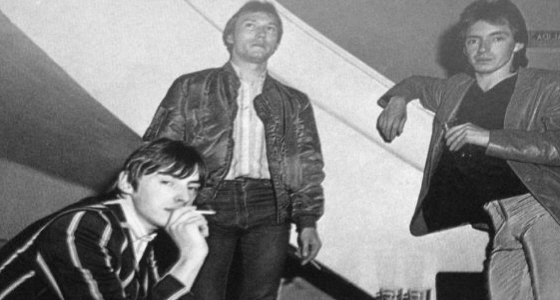
As I wanted to keep my powder dry, I didn’t play the single to the company and armed with an acetate, met up with Clive in his office. I was little worried about the lyrics, which alluded to politicians’ covert sexual proclivities, and asked Clive whether they were going to be a problem with the eggheads at Radio 1. He was very positive and went on to explain how he was going to work the single. At the end of the meeting, I told him; “as long as I can get this past the MD you’ve got the job.” I then organised a meeting with the MD, Tony Bramwell, and John Weller, to discuss the promotion of ‘Eton Rifles’.
By the time the meeting took place, I’d played the record to the company, but hadn’t mentioned my clandestine meeting with Clive. John opened up the discussion, growling; “the boys are not happy with the way they are being promoted, we’re not getting the airplay that the other wankers are.” I have to give Tony his due as he promptly admitted that his relationship with The Jam was a problem and we continued discussing the matter without coming to any conclusions. John piped up; “something’s gotta be done, what do you think Den?” I expected the MD to step in, but he had inexplicably gone into silent mode, and it was left to me make a decision. I reluctantly said there has to be a change, The Jam’s next single is important and we need to bring in someone else. I then mentioned I’d spoken to Clive Banks, and providing everyone was OK about him, he was up for it. However, I didn’t mention the fact that I had played him the single first. As far as John and the MD go, I was more than a little pissed off with them. They both had the clout, but not the bottle to ask Tony to stand aside, and left me to shovel the shit. The single was released on 26th October, it reached number three in the charts, and gave The Jam their first top five single. They increased their fan base to a level that would see them regularly sell in excess of a quarter of a million singles and it proved to be a springboard for greater things to come. 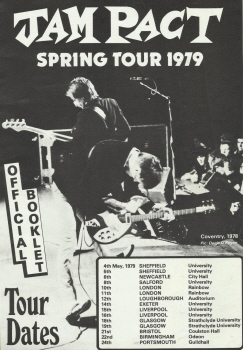 Much has been written about Polydor exerting pressure on The Jam to complete Setting Sons their fourth album, which isn’t quite true, or at least that’s not how I remember it. They knew they had to record a new album and The Jam’s tour schedule for the middle of 1979 was light. The end of year tour would have been booked, and there would have been no point in playing a massive (sell-out) tour without a new album in the shops. If we postponed the album, it would have meant undertaking a second UK tour in the New Year to support its eventual release. There’s no doubt that as the deadline got nearer, pressure was brought to bear on the band to finish the album. However, The Jam had moved on from being a niche band, and under no more pressure than the other bands on Polydor or any other record company. The release date had nothing to do with being in time for the Christmas market, and there could be no complaints about Vic, as he couldn’t record the album any faster than Paul wrote the tunes.
Much has been written about Polydor exerting pressure on The Jam to complete Setting Sons their fourth album, which isn’t quite true, or at least that’s not how I remember it. They knew they had to record a new album and The Jam’s tour schedule for the middle of 1979 was light. The end of year tour would have been booked, and there would have been no point in playing a massive (sell-out) tour without a new album in the shops. If we postponed the album, it would have meant undertaking a second UK tour in the New Year to support its eventual release. There’s no doubt that as the deadline got nearer, pressure was brought to bear on the band to finish the album. However, The Jam had moved on from being a niche band, and under no more pressure than the other bands on Polydor or any other record company. The release date had nothing to do with being in time for the Christmas market, and there could be no complaints about Vic, as he couldn’t record the album any faster than Paul wrote the tunes.
Paul’s intention that the fourth album would be a concept album, based on his left of centre politics didn’t quite work, and only a few of the songs fit this theme. It was an ambitious idea, and when they went into the Townhouse studios, they’d only demoed about half the album. The running order wasn’t decided until the last minute and the initial pressings had the track-listing stickered on the back of the sleeves. As far as the sleeve goes, Bill Smith did a great job, and the packaging is superb. The front showed the striking image of the Benjamin Clemens sculpture of three St John’s Ambulance Bearers. The inner bag contained the lyrics and photos of a very English bulldog and Union Jack deck chair on Brighton beach. The album sleeve won an award in 2002 and voted one of the best album covers of all time.
The album was released on 16th November, and Vic’s production was slicker than the records that preceded it, something that Paul wasn’t happy about, finding the sound a little dense with too many overdubs. ‘Private Hell’ was a damming indictment on middle-class suburban life and the desperation of a middle-aged woman in crisis. When Paul wrote the lyrics, there was more than a grain a truth in them and he told me the name of the person the song was about. ‘Thick As Thieves’, a song about friends falling out, might have been an early signpost that all was not well within the group. By 1979, they each had their own circle of friends, and rarely socialised outside of recording and touring. It’s been said that this song is about Paul’s changing relationship with his old schoolmates, Dave Waller and Steve Brookes.
I grew up on a council estate in Plumstead and ‘Saturday’s Kids’ was a tune that I could really relate to. The revamped version of ‘Smithers-Jones’, which was Vic Smith’s idea, hearkens back to The Beatles ‘Eleanor Rigby’. It’s certainly no embarrassment amongst the other tunes on the album, though I wonder if Paul had written enough songs to complete the album, would they have recorded this version.
‘Little Boy Soldiers’ is an anti-war statement and an attack on the kind of naïve patriotism that leads to the unnecessary deaths of young men in the name of their Queen and country. Given what is going on in the Middle East for the last two decades, nothing seems to have changed, and this song is as meaningful now as it was 35 years ago.
Two demo versions of ‘Burning Sky’ (one is featured on Setting Sons Deluxe) were recorded at the same time as ‘Thick As Thieves’. Plus two versions of ‘Hey Mister’ (recording date unknown). ‘Burning Sky’ is about a man who has lost the innocence of youth, with mouths to feed and is making the most of the nine-to-five grind. Something that happens to everyone; did any of us see our futures when we were teenagers or want to? ‘Wasteland’ is one of the few tracks that isn’t slickly produced, although it doesn’t suffer. As a song, it’s not quite up to the quality of some of the others. Nevertheless, this melodic and wistful English tune is a nice counterpoint to some of the heavier tunes of this album.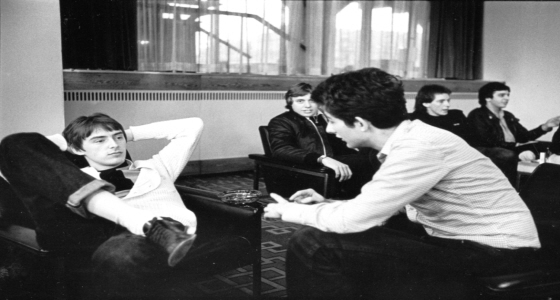
‘Girl On The Phone’ is semi-autobiographical, and about the problems, artists face trying to retain their anonymity, something that Paul has struggled with most of his life. Too many artists have received undue attention from over obsessed fans. It’s the price you pay for fame, and once you’re up there, you can forget about privacy.
By the end of the recording sessions, the album was shy of one song. Bruce’s song, ‘Best Of Both Worlds’ (re-mixed and featured on Setting Sons Deluxe), was demoed on 14th August and recorded on 3rd September. ‘Along The Grove’ (featured on Setting Sons Deluxe) was recorded on 11th September. Paul was either unhappy or unsure about these tunes and didn’t progress them further, which is why ‘Heatwave’ was included. Ably assisting The Jam on this Motown classic are Rudi on sax and a certain Michael Talbot on Hammond organ. Personally, I’ve always preferred the version on Live Jam, which has so much energy, something that is difficult to capture in recording studios. Although the version recorded at The Jam Xmas party in 1980, by The Greyhound All Stars, takes some beating. I don’t know why Bruce’s song wasn’t included, and with a little help from Paul, it could have been better and at the very least, it was a Jam song.
However, regardless of all the problems, the album was a success and went to number four in the charts, giving The Jam their highest album chart position. The success of ‘Eton Rifles’ and Setting Sons, changed Polydor’s attitude towards The Jam, and the wounds caused by the earlier problems were healing. I recall one of the execs finally getting the message about the band at the Bingley Hall gig. As we were leaving, he was waxing lyrically about how good The Jam was, and what a great band (sic) they had become.
On November 17, 2014, Universal/Polydor will release a deluxe version of Setting Sons, and super deluxe edition 3CD/DVD Box. A while ago, Universal asked me to supply them with a list of tracks from the archives, and I sent them 23 titles and most appear on the second CD. The other titles are taken from a 1979 Peel session and have been available previously. The 2CD Deluxe version of Setting Sons sits nicely with Sound Affects and The Gift, though Universal made a pigs ear of All Mod Cons. On the third CD of the box set is the Brighton gig, which was recorded on 15th December 1979. Although I was there, I don’t recall the gig, (too much alcohol after (lol). However, it is a welcome addition to the Jam live catalogue. The additional DVD for my money is padding. It contains five promo video clips, six Top of the Pops performances, and two clips from the Something Else, and offers the Jam fan nothing new. 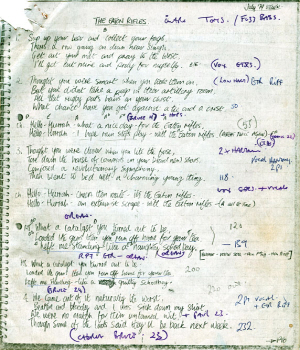 The box set is priced at £96.99, which I thought was typo, and presume one of The Jam will deliver the package personally. Having worked in the business for a good deal of my life, I understand how records are costed out, and this box set is overpriced by at least £20. The Jam’s contract contains packaging deductions to cover the costs of both standard and deluxe editions. I know the book has a hard cover, but surely, it would have been better to do a paperback version and keep the price down so more Jam fans could afford it. Like most music fans, I am not looking for a work of art, if I were; I would go to a bloody art gallery.
The box set is priced at £96.99, which I thought was typo, and presume one of The Jam will deliver the package personally. Having worked in the business for a good deal of my life, I understand how records are costed out, and this box set is overpriced by at least £20. The Jam’s contract contains packaging deductions to cover the costs of both standard and deluxe editions. I know the book has a hard cover, but surely, it would have been better to do a paperback version and keep the price down so more Jam fans could afford it. Like most music fans, I am not looking for a work of art, if I were; I would go to a bloody art gallery.
The main reason for such a high price is the record industry has been losing money (3%pa) for years. All the record companies are putting pressure on the back catalogue departments, to come up with more ideas, and to sell them on at a premium price. In other words, making the fans pay through the nose. What I don’t understand is, Jam fans have been crying out for a 4CD live box set, something I suggested to Universal years ago. However, they and PW don’t seem to be interested, though with their pricing policies, I wouldn’t be able to afford a copy on my pension.
Dennis Munday
September 2014
Ronchi Dei Legionari, Italy
Author of Shout To The Top 